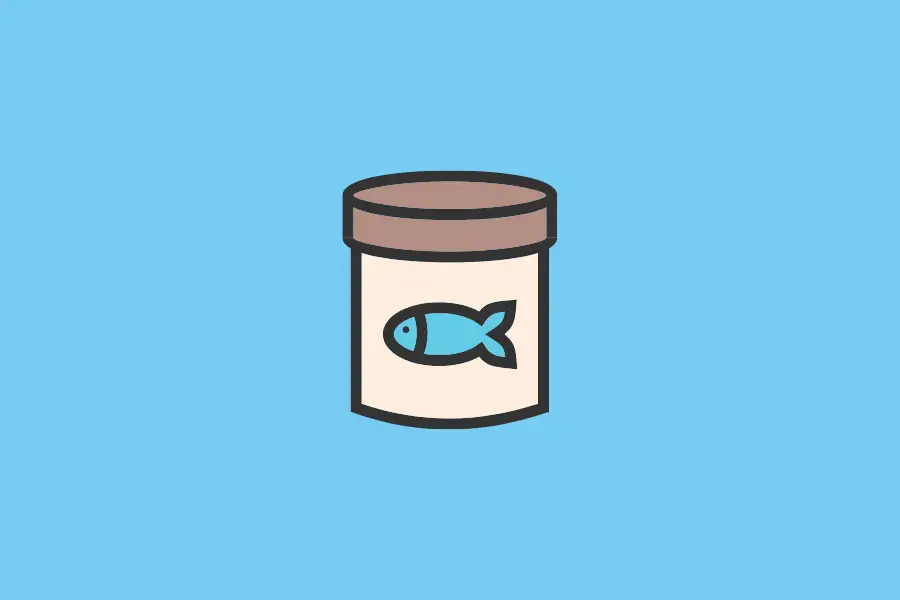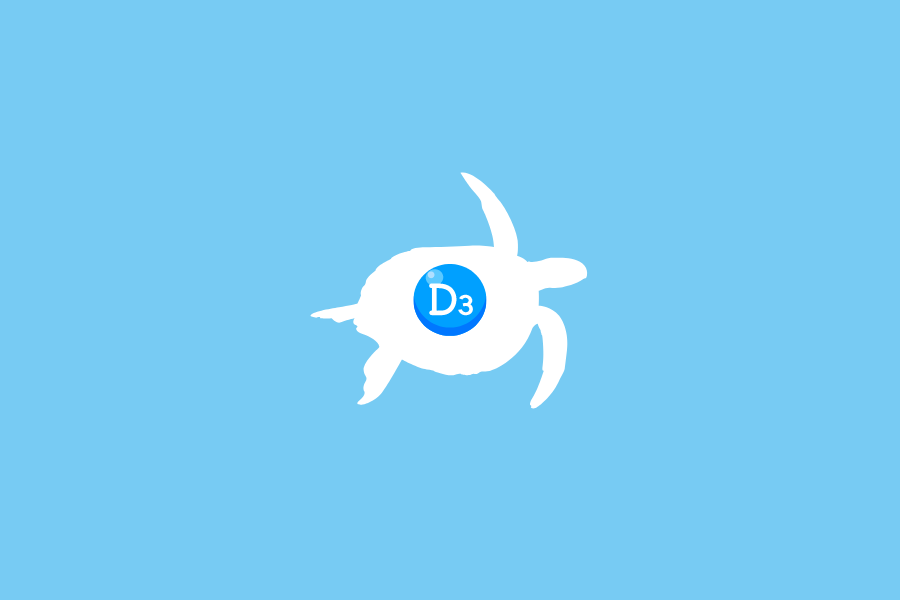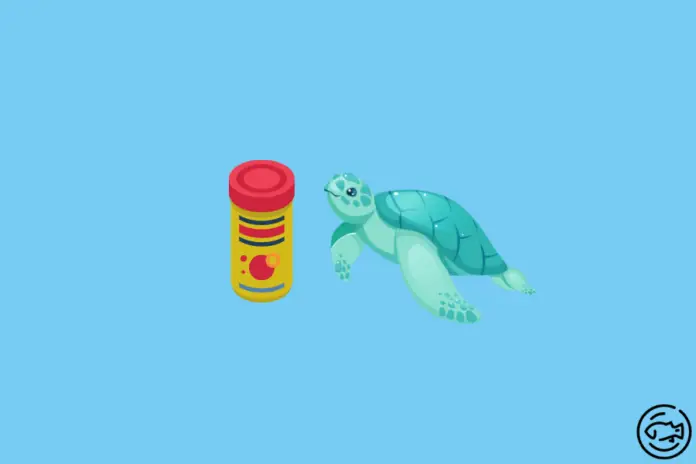As a turtle enthusiast, I have wondered about the compatibility of turtles and fish food. In this post, we will explore this intriguing topic: Can turtles eat fish food?
Understanding whether turtles can consume fish food is crucial for the well-being of our shelled companions.
Can You Feed Your Turtle Fish Food?

Yes, turtles can consume fish food without any immediate adverse effects, but it may not meet their long-term nutritional needs.
Fish food and turtle food share similarities in composition, making them generally safe for turtles to consume. Both turtles and fish are omnivores, and their commercial diets overlap in terms of nutrient content, including protein and vitamins such as A and D.
It’s important to note that not all fish food provides the necessary nutrients for a turtle’s health and well-being.
Fish food falls short in key nutrients: In most cases, fish food does not provide an adequate supply of crucial nutrients like calcium, vitamin A, and vitamin D3 to sustain a turtle’s balanced diet.
Turtles and fish food have a complex relationship that has sparked curiosity among pet owners.
One key consideration is the nutrient content of fish food compared to that of turtle food. While turtles can technically consume fish food without getting sick, it may not provide them with all the necessary nutrients for a healthy diet.
Fish food often lacks sufficient calcium, which is essential for a turtle’s bone health. It may also not contain enough vitamin A and D3, which are crucial for a turtle’s overall well-being.
Supplementing a turtle’s diet when feeding them fish food is recommended to address these deficiencies. This can be done by adding calcium or vitamin supplements specifically formulated for turtles.
Many pet owners wonder if turtles actually enjoy eating fish food. Experiments and observations have shown that some turtles are interested in consuming fish food, as this could be due to the smell or taste of the food or simply out of curiosity.
While feeding a turtle fish food occasionally may not pose any significant health risks, relying solely on this diet in the long term can lead to nutritional deficiencies.
Regarding baby turtles’ high protein requirements for growth make, providing them with an appropriate diet is even more important. While some baby turtles may eat small amounts of fish food, they should use alternatives specifically designed for their nutritional needs.
Lack Of Nutrients In Fish Food

Fish food may lack essential nutrients necessary for a turtle’s healthy diet. The nutrients that are deficient in fish food include calcium, vitamin A, and vitamin D3.
Calcium deficiency can lead to bone deformities and limited movement in turtles. Insufficient vitamin A can result in puffy eyes or discharge.
The inadequacy of vitamin D3 is crucial as it affects calcium absorption in turtles. Therefore, it is important to diversify a turtle’s diet to ensure it receives all necessary nutrients for its well-being and growth, beyond just fish food.
Calcium Deficiency In Fish Food
To supplement the calcium intake of turtles-fed fish food, it is important to provide additional sources of calcium.
This can be achieved by incorporating calcium-rich foods like leafy greens, beans, or calcium supplements made for turtles. Monitoring the turtle’s diet and ensuring they receive enough calcium to prevent any deficiencies is crucial.
It is essential to note that while fish food may be suitable as an occasional treat or supplemental food for turtles, it should not be their primary source of nutrition. A varied diet consisting of animal and plant-based foods is necessary for a turtle’s overall well-being.
Efficient management of calcium deficiency in fish food is vital for ensuring pet turtles’ long-term health and vitality.
Fish food may be rich in Omega-3, but it’s like putting a Band-Aid on a broken shell regarding a turtle’s vitamin A needs.
Insufficient Vitamin A In Fish Food
Vitamin A inadequacy in fish food is an important consideration for turtle diet. Lack of vitamin A can lead to puffy eyes and discharge in turtles, indicating a deficiency.
It is crucial to ensure that turtles have sufficient vitamin A in their diet to maintain their overall health and well-being. However, fish food alone may not be able to fulfill the vitamin A requirements of turtles, necessitating additional supplementation or inclusion of other nutrient-rich foods in their diet.
Vitamin A plays a vital role in the growth and development of turtles, and its insufficiency can have detrimental effects on their health.
Fish food may be great for aquariums, but turtles need more than a lackluster D3 performance to shine in their diet.
Importance Of Vitamin D3 For Turtles
Vitamin D3 plays a crucial role in the health and well-being of turtles, but fish food is inadequate in providing this essential nutrient. Turtles rely on vitamin D3 for proper calcium absorption, which is vital for their bone development and overall growth.
Unfortunately, fish food lacks sufficient amounts of vitamin D3 to meet the needs of turtles. To ensure the optimal health of turtles, it is important to provide them with alternative sources of vitamin D3 to prevent health issues like weak bones and shell deformities.
Turtles require vitamin D3 for calcium absorption and overall growth, but fish food does not contain enough of this essential nutrient. Without adequate vitamin D3, turtles may experience weakened bones and shell deformities. Therefore, it is crucial to supplement their diet with other sources that are rich in vitamin D3.
Do Turtles Like Fish Food?
Based on our observations, we’ve consistently noticed that turtles tend to have a strong preference for fish food. To assess this, we conducted experiments where we simultaneously introduced fish food and turtle-specific food into the tank.
In the majority of cases, the turtles displayed a clear preference for the fish food.
It’s uncertain whether this preference is due to the relative rarity of fish food in their diet, piquing their curiosity, or if it’s simply because they find the flavor more appealing.
Fish flakes, as opposed to standard commercial turtle food, often offer a broader range of flavors, which might contribute to their attractiveness to turtles.
Overall, through various experiments and observations focusing on the interactions between turtles and different types of food, it becomes evident that although turtles can consume fish food without falling ill, it does not adequately fulfil their nutritional requirements.
For a turtle to have optimal health and well-being, it’s important to include various nutritionally balanced options in their diet.
Possible Reasons For Turtles’ Interest In Fish Food
Researchers have identified several factors that may explain why turtles are interested in fish food. One possible reason is the smell and taste of fish food, which may appeal to turtles due to their natural instinct to seek out protein sources.
Another factor could be the texture of fish food, as turtles may find it easier to consume than their regular diet. Some studies suggest that fish food may contain certain additives or ingredients that attract turtles. As further research is conducted, more insights may be uncovered into the possible reasons for turtles’ interest in fish food.
How long can you feed your turtle fish food? Dive into the risks and signs of an inadequate diet that could leave your turtle feeling like a fish out of water.
How Long Can You Feed Your Turtle Fish Food?
When it comes to feeding turtles fish food, it’s important to consider the duration of this dietary choice. How long can you safely rely on fish food as your turtle’s primary nutrition source?
This section will explore the recommendations for feeding turtles fish food and delve into the potential risks of a prolonged fish food diet.
We’ll also discuss the signs to watch out for that may indicate an inadequate diet in turtles solely fed fish food. When considering their dietary needs, it’s crucial to prioritize your turtle’s health and well-being.
Risks Of Prolonged Fish Food Diet For Turtles
In the event that you exclusively provide your turtle with fish food, it’s essential to remain vigilant for the following indicators:
- Swollen Eyes or Discharge
Should you observe signs of puffy eyes or any discharge from your turtle’s mouth or nostrils, there is a strong likelihood of a vitamin A deficiency. This condition commonly arises when fish food constitutes a prolonged dietary staple.
If you suspect this deficiency, it’s imperative to introduce foods rich in vitamin A to your diet promptly.
- Bone Deformities and Limited Mobility
- Continuously feeding your turtle a fish-based diet over an extended duration increases the risk of calcium and potentially vitamin D deficiencies, which can severely affect their overall health.
- Manifestations of metabolic bone disease may become evident, such as soft or distorted shell growth and swelling of their limbs, leading to impaired swimming or walking abilities.
- Upon the onset of any of these symptoms, it is crucial to supplement their diet with calcium and vitamin D immediately.
It is crucial to maintain a balanced and nutritious diet for your turtle’s overall health. These precautions can reduce potential health problems caused by an excessively fish-based diet.
Can Baby Turtles Eat Fish Food?
When it comes to feeding baby turtles, one common question that arises is whether they can consume fish food.
Our recommendation is to refrain from offering fish food to baby turtles.
While it won’t induce illness, it’s important to recognize that the dietary requirements of young turtles are more delicate in comparison to their adult counterparts, primarily due to their rapid growth phases.
The nourishment of baby turtles necessitates elevated protein intake to facilitate their burgeoning development, a facet insufficiently addressed by most fish food products. Consistently providing baby turtles with fish food over an extended duration can lead to growth retardation.
If fish food is the only option available, you can augment your baby turtle’s diet with protein-rich alternatives. You can capture insects like crickets and grasshoppers outdoors, which are high in protein and can meet your turtle’s protein requirements effectively.
Conclusion: Can Turtles Eat Fish Food?
To recap, we have explored various aspects related to this topic, considering turtles’ nutritional needs and preferences.
As previously discussed, offering your turtle fish food is generally acceptable since it closely resembles turtle-specific nutrition.
Nevertheless, it’s important to note that fish food lacks some essential nutrients necessary for a turtle’s overall diet, making it unsuitable as a sustained dietary solution.
However, it is crucial to emphasize the importance of diversifying a turtle’s diet beyond just fish food.
FAQs About Can Turtles Eat Fish Food?
Q. Can Turtles Eat Fish Food?
Yes, turtles can eat fish food, but it may not provide them with enough nutrients in the long run.
Q. Do turtles like the flavor of fish food?
In general, turtles tend to enjoy the flavor of fish food. Fish flakes may have more diverse flavors compared to commercial turtle food.
Q. What are the health risks of feeding a turtle-only fish food?
Feeding a turtle only fish food can lead to health issues such as vitamin deficiencies, puffy eyes, bone deformity, and lack of movement. It is crucial to provide a well-rounded diet for optimal turtle health.
Q. Can baby turtles eat fish food?
Baby turtles should not solely be fed fish food. Their diets require higher protein content for proper growth. Consider supplementing their diet with insects or other high-protein foods.


